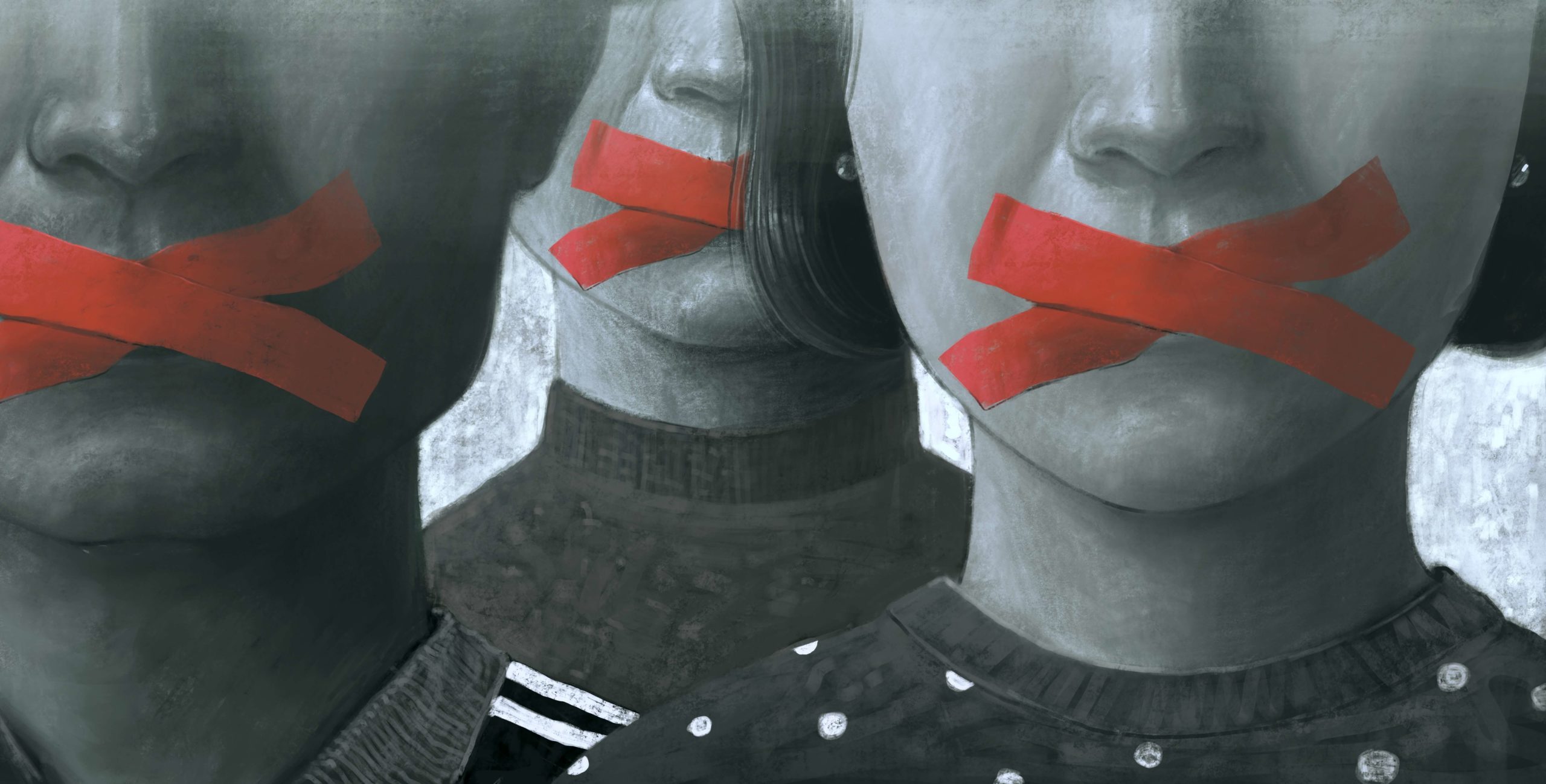“If you say to me, ‘Socrates… you shall be let off, but upon one condition, that you are not to enquire and speculate in this way any more, and that if you are caught doing so again you shall die’; if this was the condition on which you let me go, I should reply: ‘Men of Athens, I honour and love you; but I shall obey God rather than you, and while I have life and strength I shall never cease from the practice and teaching of philosophy.’”
—Socrates
In antiquity, Athens sparked the debate over the freedom of speech through its democratic principles, philosophical debates, and theatre. From the 5th century BC, the Greeks developed a taste for talking about anything and satirizing anyone, including wealthy citizens, or even gods. The tension between what was allowed and what was not led to even more difficult moments to decipher—Socrates was forced to drink poison, and Aristophanes was summoned several times before the judges for his plays. Nevertheless, many of the principles stated then are still found today in the way we define the concept of freedom of expression.
Professor of Political Science, Arlene W. Saxonhouse, rightly observed that the reason for Socrates’ condemnation, in 399 BC, “was not Socrates’ hostility to Athenian democracy, but rather the incapacity of any regime—even, or especially, one devoted to the openness of speech in the practice of self-rule—to ignore the needs of ‘shame’: that which restrains behaviour not simply through laws or the threat of punishment, but by ingrained sensitivity to the judgmental gaze of others and to the historical and social setting in which one lives.”[1]
It is in this tension between the rational acknowledgement of the freedom of speech and the fear of speaking differently from how others expect you to (this is what Saxonhouse refers to when using the word “shame”) that the history of this fundamental human right—speaking freely in accordance with one’s own conscience—was written. The story is general for all ancient or modern cultures, even if the characters have different names. The Romans are known for the rights and freedoms they granted to their citizens, but also for their bloody persecutions, in the first centuries after Christ, against those who thought, and consequently, spoke, differently.
If, in ancient societies, who were mostly oral, the right to an opinion usually referred to the idea of being able to speak freely about anything or anyone, with the invention of the printing press and the spread of printed materials, the theme of freedom of expression strongly reclaimed its place in the debate and gained new importance.
A brief history of the freedom of speech
The struggle for freedom of speech was not always born out of a desire to defend freedom in itself or someone’s rights. Often, on the old continent, it took the form of a power struggle between the monarchy, the nobility, and the church. Paradoxically, the church, so cruelly persecuted in the apostolic period and the first centuries of its history, had become an important factor in restricting human freedoms and rights in the Middle Ages. This type of conflict between the three pillars of influence created the context in which, in England, on June 15 1215, King John was forced by his nobles to sign the Magna Carta Libertatum (The Charter of Liberties).
The Charter, which limited the powers of the king and increased the role of parliament, became the foundation of the British constitutional system. The fight against the king was indirectly also a fight against the Catholic Church, which controlled the king. The conflict that arose eventually led to the separation of the Church of England from Rome and the establishment, in 1689, of the Bill of Rights, which guaranteed freedom of speech in parliament.
“The right of every man has no limits” was one of the postulates that popularized the Declaration of the Rights of Man and of the Citizen, elaborated by France’s National Constituent Assembly, on August 26, 1789. In its 17 articles, the document, which is the basis of the 1791 Constitution, included equal rights for all citizens of the country, thus abolishing any previous feudal privileges. These ideas, however, had not come out of the blue.
The fifteenth and sixteenth centuries had brought into the European world two movements designed to tear down the traditional philosophical, social, political, and religious structures.
The first was the Protestant Reformation, which, by giving people the Bible, placed the seeds of the idea of freedom in their hands. The Reformation was not only a protest against the abuses of the Catholic Church but also an important factor in social emancipation. Ordinary people, defying the machinations of the ruling classes, began to read, discuss, ask questions, learn that they have value, rediscover their identity, and demand to be respected.
The second movement that would influence Europe’s development during this period was the rediscovery of Antiquity, especially Greek philosophy, by more and more intellectuals dissatisfied with the narrow views of the church. This opened an inexhaustible stream of opinions and theories, which, opposed to mysticism and ecclesiastical abuses, had increasingly alienated people from the church.
French intellectuals tried to separate the ideas of freedom from the Judeo-Christian lode, announcing and celebrating the rule of reason. Unfortunately, the French Revolution proved to be a failure. The Reign of Terror that followed proved that human reason was not enough to implement the principles of freedom. Still, the biggest gain of the Declaration of the Rights of Man and of the Citizen was that, for the first time, it expressed the same ideas that had begun to emerge in all parts of the world.[2]
Jean Jacques Rousseau said that an individual should never be forced to give up his or her natural rights to a king.
At the end of the American Revolution, the First Amendment to the United States Constitution, ratified on December 15 1791, guaranteed the freedoms of expression, the press, and religion. The wording that has become famous is this: “Congress shall make no law respecting an establishment of religion, or prohibiting the free exercise thereof; or abridging the freedom of speech, or of the press; or the right of the people peaceably to assemble, and to petition the Government for a redress of grievances”.
However, unlike France, where the Revolution failed to give the country the promised freedom, the document ratified in 1791 in the United States continues to be valid today. The secret, or difference between the two revolutions, according to Professor and writer Larry Schweikart from the University of Dayton, is that the American Revolution was based on the individual, while in France, the emphasis was more on the group than on the individual. This idea is shared by the writer David Barton, who, in a televised interview with Schweikart, stated:
“When you look at the French Revolution, the French Revolution started out with the desire for envy. What split France was that you had people that wanted what other people had.”
The logical conclusion we can draw from this is that the people who win become the target of a new revolution, which is what happened in France. The two believe that the danger for a society is to be so focused on adopting an “us vs. them” mentality that it fails to find common ground.
Although it was more difficult for Europeans to adopt this perspective, declarations of rights and freedoms multiplied in the 19th century. A long series of revolutions shook the old continent from one end to the other, giving people the opportunity to express themselves freely and fight for their freedom. In Europe, the development of the idea of nation was interstitially linked to that of freedom.
At the beginning of the twentieth century, things seemed to be clear. Mankind was on its way to freedom like never before. Then, the world wars began. But they ended with an even greater desire for change. On the 10th of December 1948, the UN General Assembly voted on the Universal Declaration of Human Rights, which was adopted almost unanimously[3] by those present. The document states, from its first article, that “all human beings are born free and equal in dignity and rights”.
This document is both the end and the beginning of the road. It would later become the standard by which freedom of speech would be understood worldwide. Since its adoption, the discussion on rights and freedoms has been conducted differently. Evidently, it will not be the only document on this subject and it will not solve all the world’s problems by itself. The European Convention on Human Rights, which was adopted on the 4th of November 1950, is a fundamental document on the protection and guarantee of human rights as well.
A meaningful story
On January 7th, the very day of the attacks in France, two important saints were celebrated according to the Orthodox and Catholic calendars. For Christians in the West, the day was dedicated to Raymund de Penyafort, a Catalan monk born near Barcelona, who distinguished himself by his special interest in converting Muslims. It seems that he managed to convert many, but his biographers mention a detail: Raymund de Penyafort strongly supported the institution of the Spanish Inquisition. On the same day, the Church in the East celebrated John the Baptist. He died at the hands of Herod’s executioner because he spoke openly about the king’s sins. This is another lesson about the freedom of speech and its price.




















